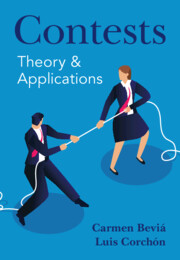Book contents
- Frontmatter
- Contents
- Illustrations
- Tables
- Preface
- Book Outline
- How to Use This Book
- Part I Foundations
- Part II Extensions
- Part III Applications
- 9 Contests in Other Environments: Draws, Large Contests, and Entry
- 10 Contests in Classical Problems: Divisionalization, Monopoly Welfare Losses, Coase Theorem, Voting
- 11 Contests, Institutions, Wars, and Economic Success
- 12 Contests: Social Welfare and Public Policy
- Summary: The Lost Continent – A Tale of Discovery
- References
- Index
10 - Contests in Classical Problems: Divisionalization, Monopoly Welfare Losses, Coase Theorem, Voting
from Part III - Applications
Published online by Cambridge University Press: 30 May 2024
- Frontmatter
- Contents
- Illustrations
- Tables
- Preface
- Book Outline
- How to Use This Book
- Part I Foundations
- Part II Extensions
- Part III Applications
- 9 Contests in Other Environments: Draws, Large Contests, and Entry
- 10 Contests in Classical Problems: Divisionalization, Monopoly Welfare Losses, Coase Theorem, Voting
- 11 Contests, Institutions, Wars, and Economic Success
- 12 Contests: Social Welfare and Public Policy
- Summary: The Lost Continent – A Tale of Discovery
- References
- Index
Summary
In Chapter 10, contest models are utilized to illuminate crucial elements of traditional economic problems. These include competition for surplus within divisionalized firms, where inefficient divisions often dominate efficient ones; the significant expenses required to attain a monopoly position, including potentially bribing public officials for the allocation of monopoly rights; and the expenses incurred in obtaining property rights that, once secured (sometimes by violent and costly means), will be efficiently exchanged in the marketplace. In the last two cases, these expenses are so substantial that they might leave no social surplus. Additionally, the cost of political campaigns, in which factions compete for the vote to control a portion or entirety of the public sector through convincing voters of the correct choice, is also examined. Overall, it is shown that contests introduce a substantial and previously unnoticed welfare cost to the traditional issues studied, thereby complementing the existing literature on the subject.
Keywords
- Type
- Chapter
- Information
- ContestsTheory and Applications, pp. 150 - 164Publisher: Cambridge University PressPrint publication year: 2024

